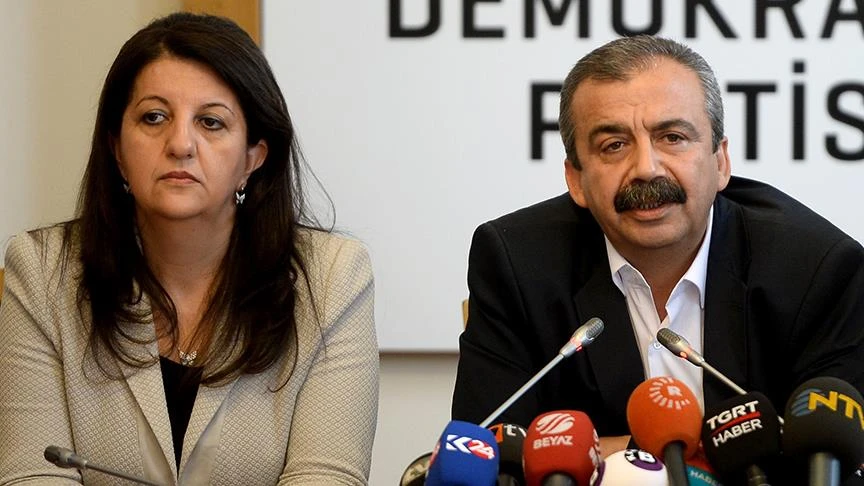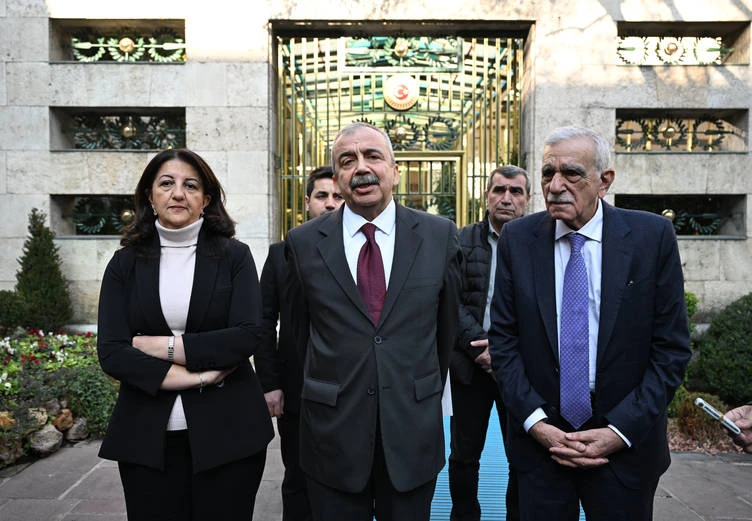Turkish Parliament deputy speaker Onder undergoes emergency heart surgery
 Turkish President Recep Tayyip Erdogan (R) as he meets with MP's of pro-Kurdish Equality and Democracy (DEM) Party Pervin Buldan (C) and Sirri Sureyya Onder (L) at the Presidential Complex in Ankara, Türkiye, April 10, 2025. (AFP Photo)
Turkish President Recep Tayyip Erdogan (R) as he meets with MP's of pro-Kurdish Equality and Democracy (DEM) Party Pervin Buldan (C) and Sirri Sureyya Onder (L) at the Presidential Complex in Ankara, Türkiye, April 10, 2025. (AFP Photo)
Turkish politician, Parliament deputy speaker and member of Imrali Delegation for the “terror-free project” Sirri Sureyya Onder was rushed into surgery following a sudden aortic dissection, one of the most serious cardiovascular emergencies. The operation, which began around midnight, is expected to last well into the early morning due to its complexity and high risk.
According to cardiology and surgical experts like Prof. Bingur Sonmez, aortic dissection ranks among the most critical interventions in heart surgery. The procedure often takes anywhere from 6 to 10 hours and is associated with a high risk of mortality and post-operative complications.
What is aortic dissection?
Aortic dissection occurs when there is a tear in the inner layer of the aorta, the main artery that carries blood from the heart to the rest of the body. Instead of bursting outward, blood enters the space between the layers of the artery wall, separating them — much like peeling apart the layers of a wafer with liquid forced in between.
Patients typically describe the onset as a sudden, severe, tearing chest pain. In many cases, individuals mistake it for a minor cardiac episode or muscle strain, delaying critical intervention. Mortality rates remain high even under surgery, with up to 30% of patients not surviving the operation.
Condition upon arrival and immediate intervention
Sources familiar with the situation indicate that Onder initially remained conscious upon hospital arrival but subsequently lost consciousness, followed by cardiac arrest. Medical teams performed an extended resuscitation before beginning surgery.
Sonmez say that patients who undergo surgery immediately after resuscitation raise considerable concern due to potential brain damage caused by limited blood flow during cardiac arrest. In such cases, the biggest unknown is whether the brain received adequate oxygen during resuscitation efforts.

Cause: Stress and chronic hypertension
Although Onder had a known history of high blood pressure, it reportedly was not severe enough on its own to trigger a dissection. However, experts highlight that extreme stress and fatigue can exacerbate existing conditions. In recent weeks, Onder was said to be under intense emotional and physical strain, which could have contributed to the episode.
Aortic dissections are most commonly linked to chronic hypertension. When the heart experiences prolonged pressure overload, the inner layers of the aortic wall can begin to weaken, eventually leading to tearing.
Long and high-risk operation
The operation began at approximately sharp midnight, following a rapid chain of emergency responses. An ambulance was dispatched around 10:10 PM, and Onder was admitted and prepped for surgery within less than two hours — a remarkably fast turnaround for a case of this magnitude.
This is a developing story. Updates will follow as more information becomes available.



